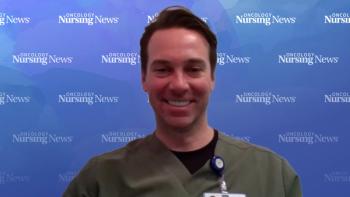
- March 2015
- Volume 9
- Issue 2
Factors Influencing Care Decisions for Patients With Advanced Cancer
A new study funded by the National Institutes of Health (NRO14856), "Factors Influencing Cancer Care Decisions," is currently underway at the Frances Payne Bolton (FPB) School of Nursing at Case Western Reserve University (CWRU) and the Seidman Cancer Center at Case Medical Center. The study focuses on the complex practice of shared decision-making in advanced cancer patients.
Amy R. Lipson, PhD
Sara L. Douglas, PhD, RN
Amy R. Lipson, PhD, is a Research Associate, and Sara L. Douglas, PhD, RN is Associate Professor and Assistant Dean for Research, at the Frances Payne Bolton School of Nursing, Case Western Reserve University, Cleveland, Ohio.
A new study funded by the National Institutes of Health (NRO14856), “Factors Influencing Cancer Care Decisions,” is currently underway at the Frances Payne Bolton (FPB) School of Nursing at Case Western Reserve University (CWRU) and the Seidman Cancer Center at Case Medical Center. The study focuses on the complex practice of shared decision-making in advanced cancer patients.
Prior research has focused on the examination of healthcare communication with patients or families, or providing more education to patients or families regarding end-of-life treatment decisions. Results from those studies have shown very mixed results, however.
This research team believes aggressiveness of care decisions that are made at end-of-life (EOL) are influenced by many factors, including healthcare providers, patients, and family—and these factors are very complex in the way that they influence aggressiveness of care decisions.
Shared Decision Making
The team, headed by FPB Associate Professor Sara L. Douglas, PhD, RN, is looking at the dyadic processes between oncologist and patient and the influences of the family caregiver and nurse on decision making. Clinical decisions are most often shared, with oncologists providing information and guidance about options and patients evaluating and choosing among the options. In addition to Douglas, the research team includes Barbara J. Daly, PhD, and Christopher J. Burant, PhD, both of the FPB School of Nursing, and Neal Meropol, MD, from the School of Medicine, Case Western Reserve University.
Many patients are influenced in their decisions by family caregiver, oncologist and/or RN evaluations of the appropriate focus of care. Thus, the phenomenon of “decision” is incompletely examined if only one component of the decision-making process is considered and measured independently of the others. This study is designed to help describe the complex nature of the decision-making process involved in EOL treatment for these vulnerable patients.
Identifying a model that predicts the utilization of aggressive EOL care is an important purpose of this study. The model will incorporate the focus of care (from the perspective of the oncologist, patient, and the oncologist—patient dyad), as well as clinical triggers, EOL preferences, treatment effectiveness, and evaluation of the focus of care (from the perspectives of the caregiver and the RN).
The researchers hope that examining dyadic relationships between oncologists and patients over time will enable them to describe key aspects that influence EOL treatment decision making. In addition, by including the influence of caregivers and RNs on EOL decision making, the researchers hope to be able to examine factors external to the patient—oncologist dyad.
Study Design
The study is using a longitudinal, descriptive, correlational design and is recruiting patients with stage IV gastrointestinal or lung cancers. If the patient has a caregiver, that individual is being recruited to participate as well. Baseline data regarding EOL values, religiosity, and optimism are gathered on patients and their caregivers.
Healthcare providers are asked (at baseline) to answer questions related to their own personal EOL values, their comfort with caring for dying patients, and their sense of religiosity. Every 3 months, patients, caregivers, oncologists, and nurses are asked to evaluate treatment effectiveness, their focus of care, the patient’s health-related quality of life, and for oncologists, their predicted survival for the patient.
We anticipate a sample size of 300 patients, 60% of whom will have caregivers enrolled in the study. There is growing concern that patterns of overly aggressive interventions in the final weeks and months of life seriously detract from quality of life and may not be consistent with patient preferences and values. We believe that it is essential to apply more comprehensive and sophisticated designs in order to be able to identify and implement interventions or decision support systems that can be tailored in such a way as to account for the complex interaction among factors.
Our analysis is expected to yield information that will help us to develop tailored, meaningful interventions that are more likely to be successful in facilitating communication and decision making for those involved in EOL decision for patients with advanced cancer, and we look forward to sharing our findings with at the conclusion of the study.
Articles in this issue
almost 11 years ago
Treating Elderly Patients: How Old Is Too Old?Newsletter
Knowledge is power. Don’t miss the most recent breakthroughs in cancer care.


















































































